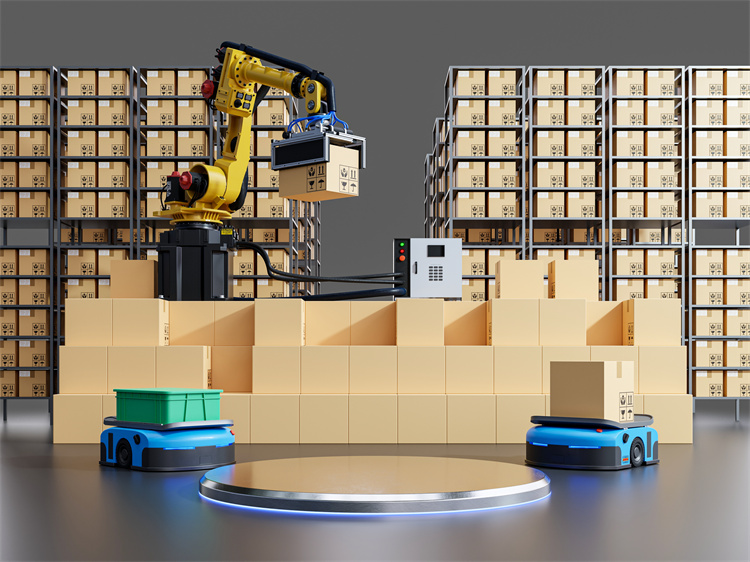Smart Logistics Applications in Japan’s Electronic Components Supply Chain

Smart logistics transforms how goods move in the Electronic Components Supply Chain. Japan's tech industry relies on precise logistics to thrive. Advanced technologies like RFID tracking and AI-driven analytics boost efficiency. These innovations ensure seamless operations and inventory management. The rise of e-commerce fuels the demand for smart logistics. Companies adapt to meet consumer needs swiftly. The market shows promising growth, driven by technological advancements. Japan's logistics sector plays a vital role in supporting the nation's tech landscape. This evolution enhances visibility and streamlines processes for better outcomes.
Overview of Japan’s Electronic Components Supply Chain
Japan's Electronic Components Supply Chain forms a complex network. This network includes various key players and stakeholders who ensure the smooth flow of components. Understanding these entities is crucial for grasping the dynamics of the supply chain.
Key Players and Stakeholders
Manufacturers
Manufacturers play a pivotal role in the Electronic Components Supply Chain. These companies produce essential components for various electronic devices. Precision and quality define their operations. Japan houses numerous manufacturers known for cutting-edge technology. These manufacturers push the boundaries of innovation. The demand for high-quality components drives their growth.
Distributors
Distributors act as intermediaries in the Electronic Components Supply Chain. They bridge the gap between manufacturers and retailers. Efficient distribution ensures timely delivery of components. Distributors manage logistics and inventory. Their role involves coordinating with multiple parties. This coordination helps maintain a seamless supply chain.
Retailers
Retailers bring electronic components to end-users. They form the final link in the Electronic Components Supply Chain. Retailers cater to consumer demands for electronic products. They rely on efficient logistics to stock their shelves. The rise of e-commerce has transformed retail operations. Retailers now focus on quick delivery and customer satisfaction.
Current Challenges in the Supply Chain
The Electronic Components Supply Chain faces several challenges. Addressing these issues is vital for maintaining efficiency and reliability.
Demand Fluctuations
Demand fluctuations pose a significant challenge. The electronics market experiences rapid changes. Consumer preferences shift frequently. Manufacturers and distributors must adapt quickly. Predicting demand accurately becomes crucial. Failure to do so leads to overproduction or shortages.
Inventory Management
Inventory management remains a critical concern. Efficient inventory management ensures component availability. Overstocking ties up capital and space. Understocking results in missed opportunities. Companies invest in smart logistics solutions. These solutions optimize inventory levels and reduce waste.
Transportation and Delivery Issues
Transportation and delivery issues affect the supply chain. Timely delivery is essential for meeting consumer expectations. Delays disrupt production schedules and sales. Japan's infrastructure supports efficient transportation. However, challenges like traffic congestion persist. Companies explore innovative logistics technologies. These technologies enhance delivery speed and reliability.
The Electronic Components Supply Chain in Japan continues to evolve. Key players and stakeholders drive this evolution. Addressing current challenges ensures a robust supply chain. Embracing smart logistics solutions enhances efficiency and competitiveness.
Smart Logistics Technologies
The world of logistics is changing fast. Smart Logistics Technologies are leading the way. These technologies make supply chains more efficient and reliable. Let's dive into some of the key innovations.
Internet of Things (IoT)
The Internet of Things is a game-changer in logistics. IoT devices, like sensors and RFID tags, track goods in real-time. Companies use this technology to monitor shipments closely. This visibility helps prevent delays and losses. Real-time tracking ensures that companies know where their goods are at all times. This information improves decision-making and boosts efficiency.
Real-time Tracking
Real-time tracking is essential for modern logistics. Sensors and tags provide constant updates on shipment locations. This data helps companies react quickly to any issues. Real-time tracking reduces the risk of lost or delayed shipments. Customers benefit from accurate delivery times. Businesses gain trust by providing reliable services.
Predictive Maintenance
Predictive maintenance keeps logistics operations running smoothly. IoT devices monitor equipment health. Data from these devices predicts when maintenance is needed. Companies fix issues before they become problems. This approach reduces downtime and extends equipment life. Predictive maintenance saves money and improves reliability.
Artificial Intelligence (AI) and Machine Learning
Artificial Intelligence and machine learning transform logistics. These technologies analyze vast amounts of data. AI finds patterns and trends that humans might miss. This insight leads to better decisions and more efficient operations.
Demand Forecasting
Demand forecasting is crucial for supply chain success. AI systems predict future demand based on data analysis. Accurate forecasts help companies manage inventory effectively. Businesses avoid overstocking and understocking. Demand forecasting ensures that products are available when needed. This capability improves customer satisfaction and reduces costs.
Route Optimization
Route optimization enhances delivery efficiency. AI-powered systems calculate the best routes for shipments. These systems consider factors like traffic and weather. Optimized routes save time and fuel. Companies deliver goods faster and at lower costs. Route optimization benefits both businesses and customers.
JUSDA and Its Role
JUSDA plays a significant role in smart logistics. This company provides innovative solutions for supply chain management. JUSDA uses advanced technologies to streamline operations.
Overview of JUSDA
JUSDA is a leader in logistics innovation. The company offers a range of services to improve supply chains. JUSDA focuses on efficiency and transparency. Their solutions help businesses meet customer demands.

JUSDA Solutions
To provide you with professional solutions and quotations.

JUSDA Solutions
To provide you with professional solutions and quotations.
Case Studies of JUSDA Implementations
JUSDA has implemented successful projects worldwide. These case studies showcase the impact of smart logistics. Companies using JUSDA's solutions report improved performance. JUSDA helps businesses reduce costs and enhance service quality. These implementations demonstrate the power of smart logistics technologies.
Benefits of Smart Logistics in the Supply Chain
Smart Logistics offers numerous benefits to the supply chain. These benefits enhance efficiency and transparency, leading to better outcomes for businesses and customers.
Increased Efficiency
Smart Logistics significantly boosts efficiency in operations. Companies experience reduced lead times and cost savings through advanced technologies.
Reduced Lead Times
Smart Logistics technologies like real-time tracking and route optimization reduce lead times. Companies deliver goods faster by minimizing delays. Shorter empty running distances for trucks also contribute to quicker deliveries. Businesses meet customer expectations with timely shipments.
Cost Savings
Cost savings emerge as a major benefit of Smart Logistics. Optimized inventory levels prevent overstocking and understocking. Companies save on transportation expenses by using efficient routes. The integration of systems like NeLOSS maximizes truck loading rates. Businesses enjoy lower operational costs and increased profitability.
Enhanced Visibility and Transparency
Smart Logistics enhances visibility and transparency across the supply chain. Improved decision-making and customer satisfaction result from these advancements.
Improved Decision Making
Companies make better decisions with enhanced visibility. Real-time data from IoT devices provides valuable insights. Businesses react quickly to changes in demand or supply chain disruptions. Predictive maintenance ensures equipment reliability, reducing downtime. Decision-makers rely on accurate information for strategic planning.
Better Customer Satisfaction
Smart Logistics leads to better customer satisfaction. Accurate delivery times and reliable services build trust with customers. Companies experiment with drone delivery systems for faster last-mile delivery. Enhanced delivery accuracy meets consumer expectations. Businesses achieve higher customer loyalty and positive reviews.
Smart Logistics transforms the supply chain landscape. Increased efficiency and enhanced visibility drive business success. Companies benefit from reduced lead times, cost savings, and improved customer satisfaction.
Challenges and Considerations
Implementation Barriers
Implementing smart logistics technologies presents several challenges. High initial costs often deter companies from adopting these innovations. The investment in new equipment and software can be substantial. Companies need to evaluate the long-term benefits against the upfront expenses. Many businesses find that the efficiency gains justify the costs over time.
Integration with existing systems poses another barrier. Many companies have established logistics systems in place. Introducing new technologies requires seamless integration. Compatibility issues can arise, causing disruptions. Businesses must ensure that new systems work well with current operations. A comprehensive approach to integration minimizes potential problems.
Data Security and Privacy Concerns
Data security and privacy concerns are paramount in smart logistics. Protecting sensitive information is crucial for maintaining trust. Companies handle vast amounts of data in logistics operations. Unauthorized access to this data can lead to significant risks. Implementing robust security measures is essential to safeguard information.
Compliance with regulations adds another layer of complexity. Different regions have varying data protection laws. Companies must navigate these regulations to avoid penalties. Adhering to legal requirements ensures smooth operations. Businesses must stay informed about changes in legislation. A proactive approach to compliance prevents unnecessary waste of resources.
Smart logistics technologies offer many benefits but come with challenges. Companies must address high initial costs and integration issues. Data security and regulatory compliance are critical considerations. Overcoming these barriers leads to more efficient and reliable logistics operations.
Future Trends in Smart Logistics

The logistics industry is on the brink of a technological revolution. Emerging technologies are reshaping how goods move from point A to point B. These innovations promise to enhance efficiency and reliability in logistics operations.
Emerging Technologies
Blockchain
Blockchain technology is making waves in logistics. This technology offers a secure way to track transactions. Each transaction gets recorded in a digital ledger. This ledger is tamper-proof and transparent. Companies use blockchain to ensure data integrity. This technology enhances trust among supply chain partners. Blockchain reduces fraud and errors in logistics operations.
Autonomous Vehicles
Autonomous vehicles are changing the face of logistics. These vehicles operate without human drivers. Companies use them for transporting goods. Autonomous vehicles improve delivery speed and reduce costs. They also enhance safety by minimizing human error. The logistics industry sees great potential in these vehicles. Autonomous vehicles promise to revolutionize last-mile delivery.
Evolving Business Models
Collaborative Logistics
Collaborative Logistics is gaining traction in the industry. Companies work together to optimize resources. This approach reduces costs and improves efficiency. Businesses share transportation and storage facilities. Collaborative Logistics leads to better utilization of assets. Companies benefit from shared knowledge and expertise. This model fosters innovation and growth in the logistics sector.
On-demand Warehousing
On-demand warehousing offers flexible storage solutions. Companies rent warehouse space as needed. This model adapts to changing demand levels. Businesses avoid long-term commitments and reduce costs. On-demand warehousing provides scalability and agility. Companies can expand or contract storage space quickly. This flexibility meets the dynamic needs of modern logistics.
Evolving Smart Logistics Solutions are transforming the industry landscape. Emerging technologies like blockchain and autonomous vehicles offer exciting possibilities. New business models such as Collaborative Logistics and on-demand warehousing provide innovative approaches. These trends promise to enhance efficiency, reduce costs, and improve service levels in logistics operations.
Japan Technology Logistics Market
The Japan Technology Logistics Market is experiencing rapid growth. This growth is fueled by advancements in technology and the increasing demand for efficient logistics solutions. The market reached a valuation of USD xx.x Billion in 2023. Projections indicate it will achieve USD xx.x Billion by 2031, demonstrating a compound annual growth rate (CAGR) of xx.x% from 2024 to 2031.
Consumer Electronics Logistics Market
The Consumer Electronics Logistics Market plays a crucial role in Japan's economy. This market ensures the efficient distribution of electronic products across the country. Key sectors experiencing notable expansion include automotive, electronics, healthcare, industrial, and consumer goods. The logistics associated with consumer electronics, such as smartphones and tablets, requires precision and efficiency.
Market By Application Analysis
The Consumer Electronics Logistics Market is segmented into various applications. Each application plays a vital role in ensuring the smooth flow of goods. Transportation management applications focus on improving the efficiency of goods movement across Japan's logistics networks. Solutions often integrate GPS tracking, route optimization algorithms, and telematics to streamline delivery operations and reduce transit times.
Application Analysis Reports
Application Analysis Reports provide insights into the performance of different segments within the Consumer Electronics Logistics Market. These reports highlight trends, challenges, and opportunities in the market. Companies rely on these reports to make informed decisions and optimize their logistics strategies.
Cable reel management
Cable reel management is a critical aspect of the Japan Technology Logistics Market. Efficient management of cable reels ensures the smooth operation of logistics processes. Proper handling and storage of cable reels prevent damage and reduce costs.
Cable
Cable logistics involves the transportation and storage of cables used in various industries. The electronics industry requires precise handling of cables to maintain quality and performance. Efficient cable logistics solutions enhance the reliability of supply chains.
Management
Effective management of cable logistics involves the use of advanced technologies and strategies. Companies implement systems to track and monitor cable movements. This approach ensures timely deliveries and reduces the risk of errors.
deliver Smart Logistics
The deliver Smart Logistics initiative focuses on enhancing the efficiency and reliability of logistics operations. Companies like LOGISTEED and LFS are at the forefront of this movement. These companies develop innovative solutions to streamline logistics processes and improve service quality.
LOGISTEED
LOGISTEED is a leader in smart logistics solutions. The company offers a range of services to optimize supply chain operations. LOGISTEED focuses on efficiency, transparency, and customer satisfaction. Their solutions help businesses meet the demands of the modern logistics environment.
LFS
LFS provides cutting-edge logistics solutions to enhance operational efficiency. The company specializes in integrating advanced technologies into logistics processes. LFS's solutions improve delivery speed, reduce costs, and increase customer satisfaction.
The Japan Technology Logistics Market continues to evolve, driven by technological advancements and the growing demand for efficient logistics solutions. The market's growth presents opportunities for companies to innovate and enhance their logistics operations.
Smart logistics has revolutionized Japan's electronic components supply chain. Advanced technologies like AI and IoT have enhanced efficiency and transparency. The future holds immense potential for further innovations. Emerging trends promise to transform logistics operations. Stakeholders must embrace these advancements to stay competitive. Adopting smart logistics solutions will drive growth and sustainability. The journey toward a smarter supply chain requires collaboration and commitment. Businesses should seize opportunities to innovate and optimize processes. The path forward is clear: embrace technology for a brighter logistics future.
See Also
Tomorrow's Logistics Revolutionized by AI in the Supply Chain
Supply Chain Revolution Explored through Robotics Technology
High-Tech Manufacturing's Supply Chain Issues Streamlined with Solutions
Cloud Technology Solutions Enhancing Supply Chain Efficiency
High-Tech Manufacturing Success Navigated through Lean Logistics
